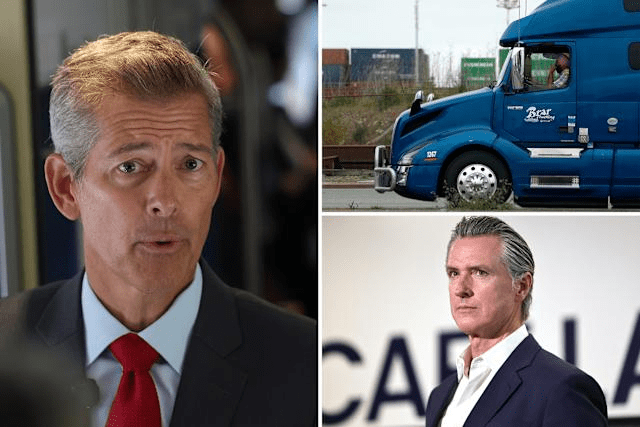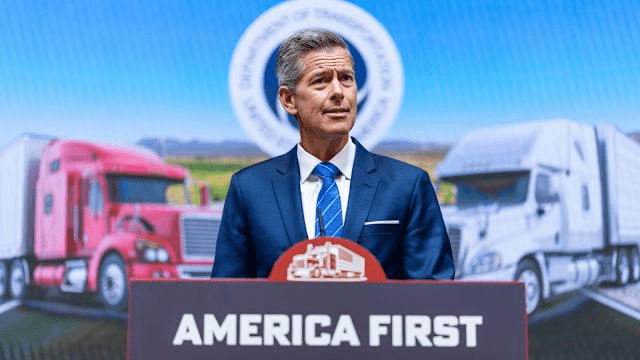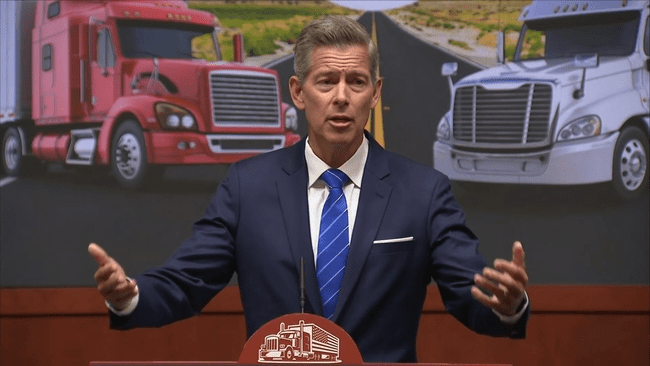Sean Duffy slashes $40M in federal highway funds from California — says state ignored Trump’s English-proficiency rules for semitruck drivers
In a major enforcement move straight out of Washington’s toughest playbook, Transportation Secretary Sean P. Duffy announced that the federal government will withhold $40 million in highway and safety funds from California because the state has failed to enforce newly mandated English language proficiency requirements for commercial truck drivers. The decision comes amid a national push under President Trump to tighten standards, hold states accountable, and prevent dangerous breakdowns on U.S. roads.

The dispute erupted after a fatal crash in Florida in August, when Harjinder Singh — a trucker licensed in California — made an illegal U-turn, causing a collision that left three people dead. Investigators later determined the driver had severe issues with English comprehension, scoring just 2 out of 12 on a post-crash verbal test, and failing to properly identify highway signs. The event triggered fierce scrutiny of state-issued commercial licenses and broader regulatory gaps. The Trump administration immediately pointed to California as a major weak link in enforcing language rules dating to an April executive order.

Duffy and federal officials argue the state’s actions — or lack thereof — jeopardize public safety. He emphasized that a truck driver must be able to read road signs and communicate effectively with law enforcement. “California is the only state in the nation that refuses to ensure big rig drivers can read our road signs and communicate with law enforcement,” he stated, warning that failure to comply could cost the state even more funds.

California, however, pushed back forcefully. State officials cited statistics showing that commercial drivers in California have a fatal crash rate significantly lower than the national average. They contended that the state already enforces safety rules and that the Trump administration is ignoring the bigger picture. A spokesperson for Gov. Gavin Newsom said, “the facts don’t lie” and accused the administration of weaponizing the tragedy for political purposes.
Under the Department of Transportation’s formal notice, California has 30 days to come into compliance: adopt English proficiency rules consistent with federal law, begin active roadside tests for drivers, and remove any who fail from service. Otherwise, the suspension of funds — tied to the Motor Carrier Safety Assistance Program — will stand.

This move is not isolated. The Trump administration has already threatened to withhold additional amounts—up to $160 million—from California if it continues issuing commercial licenses without enforcing the English rules. In tandem, the State Department has paused issuance of employment visas for commercial drivers until the gap is closed.

The stakes are high on both sides. For Washington, the message is clear: no state is above oversight, and public safety demands uniform standards. For California, the fight is about autonomy, legal jurisdiction, and political resistance. Supporters of the Trump administration’s approach call it a bold stand for accountability, insisting that states blocking enforcement become complicit in avoidable tragedies. Detractors warn that the approach risks punishing states and drivers unfairly, especially those in diverse regions where English is not the first language. Critics argue that experience, not just language, matters when assessing risk.
Beyond the clash over funds lies a deeper narrative about how much control the federal government can exert over state operations. Whether California capitulates or holds its ground, the fallout will ripple through the trucking industry, through interstate commerce, and through the broader debate over who sets the rules in America.



